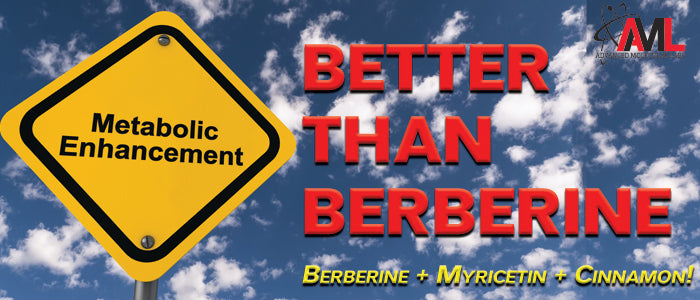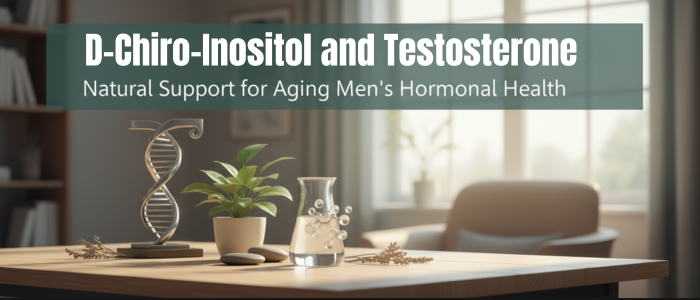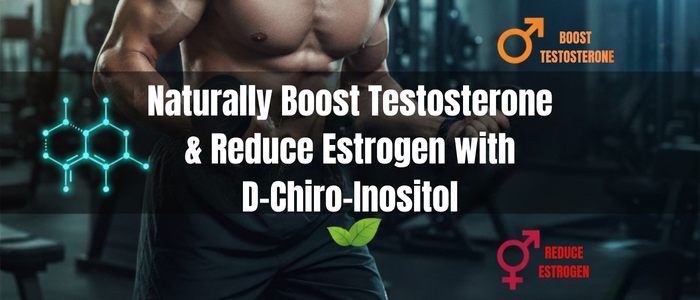


Berberine Synergy: Cinnamon's Weight Loss & Health Benefits
Better Than Berberine: Berberine + Myricetin + Cinnamon for Maximum Health Benefits!
By Robert Schinetsky
Berberine is a popular dietary supplement renowned for its various health benefits, including those related to supporting healthy blood sugar levels, weight loss, and cardiovascular function. The berberine supplement benefits extend to a wide range of health improvements, highlighting the berberine health benefits that many seek.
Additional studies also indicate it may be of interest for those looking to support liver function and a healthy mood. What really sets berberine over the top is the continually growing body of scientific research in animals and humans.
Today, we'll review some of the most recent research and discuss a few ways to make an outstanding supplement even better.
Let's start with the basics.
What is Berberine?
Berberine is a naturally occurring alkaloid found in various trees and shrubs, including Berberis vulgaris (European barberry), Berberis aristata (Indian barberry), and Berberis aquifolium (Oregon grape).
It has a long history of use in traditional medicine due to its bioactive properties, and it's also been used as a dye due to its brilliant yellow color.
What Does Berberine Do?
One of the main reasons that berberine has attracted the attention of researchers and supplement enthusiasts is due to its multiple actions, including[1,2,3,4,5]:
- Activation of AMP-activated protein kinase (AMPK)
- Upregulating the release of GLP-1
- Increasing the expression of insulin
- Enhancing activation of insulin receptors
- Stimulating brown adipose tissue (BAT) thermogenesis
- Increasing glycolysis (which supports ATP production)
- Reducing sugar production in the liver (hepatic gluconeogenesis)
- Attenuating the breakdown of carbohydrates in the gut
- Boosting the quantity of healthy bacteria in the gut
Regarding the first bullet point (AMPK activation), AMPK is an enzyme found in every cell of the body and plays a pivotal role in regulating metabolism and energy levels. Berberine's ability to activate AMPK in muscle and liver cells can improve insulin resistance, which enhances glucose uptake and glycogen synthesis.
Additional Berberine Health Benefits
Antioxidant Defense
Berberine also reduces mitochondrial reactive oxygen species (ROS) generation by activating sirtuin 3.[6] FYI, by enhancing antioxidant defenses and reducing ROS accumulation, berberine may offer protection against liver injury induced by oxidative stress.
Mitochondrial Biogenesis
In skeletal muscle, berberine promotes mitochondrial biogenesis, and the modulation of sirtuin 1 activity, which may offer additional mitochondrial effects.[7]
Metabolites of berberine (berberrubine and palmatine, specifically) have also been found to alleviate oxidative stress and mitochondrial dysfunction.[13]
Promotes Healthy Inflammatory Response
Recently published meta-analysis in the Journal of Translational Medicine found that berberine exerts a dual effect on insulin sensitivity and liver function, effectively mitigating insulin resistance while significantly enhancing hepatic function by alleviating inflammation. These berberine health benefits are crucial for individuals looking to improve their metabolic health.
More specifically, this meta-analysis included 10 randomized control trials (the "gold standard" of clinical research) with a total of 811 patients. Researchers concluded that (as an adjunct therapy) berberine "can improve liver enzymes, dyslipidemia, insulin resistance, and body weight in patients with NAFLD [non-alcoholic fatty liver disease] while exhibiting minimal adverse effects."[8]
These findings are particularly noteworthy when you realize that NAFLD is a leading cause of liver disease worldwide, with an estimated 32% of adults globally dealing with NAFLD.[9] We can't neglect the fact that a significant portion of the population are also insulin resistant. Insulin resistance, itself, is associated with a number of poor health outcomes, including obesity, type 2 diabetes mellitus (T2DM), metabolic syndrome, cardiovascular disease, PCOS, and cancer.[10]
Supports Gut Health
Gut health has become a major focus among researchers and the general public as the gut's role in myriad facets of daily living (mood, cognition, athletic performance, skin health, etc.) become better understood.
It just so happens that berberine is known to modulate gut microbiota and alleviate oxidative stress.[11] Specifically, berberine enhances the abundance of beneficial bacteria (probiotics), including Bifidobacterium and Lactobacillus while reducing opportunistic ne'er-do-wells (i.e. pathogens).
Supports Healthy Cholesterol Levels
One property of berberine we haven't touched upon yet is its ability to function as a natural PCSK9 inhibitor, which contributes to berberine synergy when combined with other supplements.
Why is it noteworthy?
PCSK9 inhibitor drugs have been shown to be more effective than statins for people who are unable to lower/maintain healthy LDL ("bad") cholesterol levels.
Synergistic with Other Supplements
A recent meta-analysis published in the Journal of Dietary Supplements found the berberine in combination with other ingredients was more effective than berberine alone when it came to the supplements impact on important cardiovascular health markers, including lipoprotein and triglycerides.[12]
Naturally, you're wondering what supplements complement or enhance berberine's potential. The aforementioned meta-analysis included supplements red yeast rice extract and silymarin (a chemical found in milk thistle extract), but didn't include another fascinating molecule -- Myricetin.
What is Myricetin and What Does It Do?
Myricetin is another plant-derived ingredient that's been studied for its ability to inhibit two enzymes involved in carbohydrate digestion, α-glucosidase and α-amylase. Research published in Frontiers in Nutrition found that myricetin offers support against cardiometabolic disorders in a number of ways, including[14]:
- Inhibiting the digestion and uptake of carbohydrates
- Protecting endothelial cells from oxidative stress induced by high blood sugar
- Promoting insulin secretion as a possible GLP-1 receptor agonist
This last point is particularly noteworthy since berberine stimulates GLP-1 secretion by reducing oxidative stress and mitochondrial dysfunction.[13] Animal studies have also demonstrated that myricetin inhibits DPP-4 and enhances GLP-1 levels.[16]
In other words, myricetin may delay breakdown of GLP-1, which prolongs the hormone's activity in the body.
Furthermore, recently published research in Critical Reviews in Food Science and Nutrition concluded that this mighty molecule can help improve markers of prediabetes via its actions on the gut microbiome and short-chain fatty acids (SCFAs).[15]
SCFAs, including butyrate, are important metabolites generated by the gut bacteria that can suppress immune responses by inhibiting inflammatory cells' proliferation and cytokine production.
SCFAs can also inhibit histone deacetylase, inactivate the NF-κB signaling pathways, and regulate the activation and apoptosis (programmed cell death) of immune cells.
The takeaway here is that the combination of berberine plus myricetin offers a "better berberine." One that supports cardiometabolic health and weight loss from multiple, complementary fronts.
Cinnamon
Cinnamon is a staple baking spice that's also gained traction among non-baking, supplement enthusiasts for its cardiometabolic support benefits. The benefits of cinnamon include functioning as antioxidants, potentiating insulin action, and supporting blood glucose regulation. These cinnamon health benefits make it a valuable addition to any supplement regimen.
A newly published systematic review and meta-analysis on the effects of cinnamon supplementation on markers of type 2 diabetes.[18] This meta-analysis included 28 RCTs, lasting between one to four months, with a total of more than 3,000 individuals. After analyzing the data, researchers concluded that cinnamon supplementation (≤2 grams per day) improves the glycemic and lipid profile as well as reduces body mass index (BMI).[18]
These findings are reinforced by prior a research review in Dose Response which noted that "chemicals [from cinnamon] help in decreasing insulin resistance and can act against hyperglycemia and dyslipidemia, inflammation and oxidative stress, obesity, overweight, and abnormal glycation of proteins. Cinnamon health benefits have shown to improve all of these conditions in in vitro, animal, and/or human studies."
Better Than Berberine: AML Thermo Heat GLP-1† - A Premier GLP 1 Supplement
Berberine supplements are found rather easily. Less easily found are supplements that contain berberine as well as other ingredients that complement and enhance its natural properties.
Thermo Heat GLP-1 is berberine evolved.
Thermo Heat GLP-1 contain a research-backed dosage of berberine alongside premium doses of myricetin and cinnamon to support GLP-1 activity, BAT thermogenesis, and metabolic health. This glp 1 supplement is designed to enhance berberine and weight loss benefits, offering a unique berberine and cinnamon synergy.†
Suggested Use
As a dietary supplement, take one (1) capsule of Thermo Heat GLP-1 twice daily (one with breakfast and one with dinner). For best results, use it as part of a low-calorie or low-carbohydrate diet and exercise program.
Thermo Heat GLP-1 may also be stacked with Advanced Molecular Labs supplements, including Thermo Heat, Thermo Heat Nighttime, and Thermo Heat Fat-Burning Protein or Thermo Heat Cocktail.
Takeaway
Cardiometabolic disorders are a serious threat. The kicker is that for much of the population, the adverse outcomes associated with the diseases can be avoided (or severely restricted, at the very least) with lifestyle modification, including:
- Eating a healthy diet
- Exercising regularly
- Getting 7-9 hours of sleep each night
- Not smoking
- Managing stress
- Restricting alcohol
- Spending time outdoors
- Maintaining a healthy body weight
Thermo Heat GLP-1 is better than berberine as it includes berberine + myricetin + cinnamon to support BAT thermogenesis and GLP-1 activity, aiding body recomposition and metabolic health.†
† These statements have not been evaluated by the Food and Drug administration. This product is not intended to diagnose, treat, cure, or prevent any disease.
© Published by Advanced Research Media, Inc. 2024
© Reprinted with permission from Advanced Research Media, Inc.
References
- Kong WJ, Zhang H, Song DQ, Xue R, Zhao W, Wei J, Wang YM, Shan N, Zhou ZX, Yang P, et al. Berberine reduces insulin resistance through protein kinase C-dependent up-regulation of insulin receptor expression. Metabolism. 2009;58(1):109-19.
- Ai X, Yu P, Peng L, Luo L, Liu J, Li S, Lai X, Luan F, Meng X. Berberine: A Review of its Pharmacokinetics Properties and Therapeutic Potentials in Diverse Vascular Diseases. Front Pharmacol. 2021 Nov 3;12:762654. doi: 10.3389/fphar.2021.762654. PMID: 35370628; PMCID: PMC8964367.
- Sun S, Yang Y, Xiong R, Ni Y, Ma X, Hou M, Chen L, Xu Z, Chen L, Ji M. Oral berberine ameliorates high-fat diet-induced obesity by activating TAS2Rs in tuft and endocrine cells in the gut. Life Sci. 2022 Dec 15;311(Pt A):121141. doi: 10.1016/j.lfs.2022.121141. Epub 2022 Oct 29. PMID: 36341914.
- Xie W, Su F, Wang G, Peng Z, Xu Y, Zhang Y, Xu N, Hou K, Hu Z, Chen Y, Chen R. Glucose-lowering effect of berberine on type 2 diabetes: A systematic review and meta-analysis. Front Pharmacol. 2022 Nov 16;13:1015045. doi: 10.3389/fphar.2022.1015045. PMID: 36467075; PMCID: PMC9709280.
- Och A, Och M, Nowak R, Podgórska D, Podgórski R. Berberine, a Herbal Metabolite in the Metabolic Syndrome: The Risk Factors, Course, and Consequences of the Disease. Molecules. 2022 Feb 17;27(4):1351. doi: 10.3390/molecules27041351. PMID: 35209140; PMCID: PMC8874997.
- Liu H, You L, Wu J, Zhao M, Guo R, Zhang H, Su R, Mao Q, Deng D, Hao Y. Berberine suppresses influenza virus-triggered NLRP3 inflammasome activation in macrophages by inducing mitophagy and decreasing mitochondrial ROS. J Leukoc Biol. 2020;108(1):253-66
- Gomes AP, Duarte FV, Nunes P, Hubbard BP, Teodoro JS, Varela AT, Jones JG, Sinclair DA, Palmeira CM, Rolo AP. Berberine protects against high fat diet-induced dysfunction in muscle mitochondria by inducing SIRT1-dependent mitochondrial biogenesis. Biochim Biophys Acta. 2012;1822(2):185-95.
- Nie, Q., Li, M., Huang, C. et al. The clinical efficacy and safety of berberine in the treatment of non-alcoholic fatty liver disease: a meta-analysis and systematic review. J Transl Med 22, 225 (2024). https://doi.org/10.1186/s12967-024-05011-2
- Teng ML, Ng CH, Huang DQ, Chan KE, Tan DJ, LimWH, Yang JD, Tan E, Muthiah MD. Global incidence and prevalence of nonalcoholic fatty liver disease. Clin Mol Hepatol. 2023 Feb;29(Suppl):S32-S42. doi: 10.3350/cmh.2022.0365. Epub 2022 Dec 14. PMID: 36517002; PMCID: PMC10029957.
- Li, M., Chi, X., Wang, Y. et al. Trends in insulin resistance: insights into mechanisms and therapeutic strategy. Sig Transduct Target Ther 7, 216 (2022). https://doi.org/10.1038/s41392-022-01073-0
- Yang F, Gao R, Luo X, Liu R, Xiong D. Berberine influences multiple diseases by modifying gut microbiota. Front Nutr. 2023 Aug 3;10:1187718. doi: 10.3389/fnut.2023.1187718. PMID: 37599699; PMCID: PMC10435753.
- Hernandez, A. V., Hwang, J., Nasreen, I., Sicignano, D., Pasupuleti, V., Snow-Caroti, K., & White, C. M. (2023). Impact of Berberine or Berberine Combination Products on Lipoprotein, Triglyceride and Biological Safety Marker Concentrations in Patients with Hyperlipidemia: A Systematic Review and Meta-Analysis. Journal of Dietary Supplements, 21(2), 242-259. https://doi.org/10.1080/19390211.2023.2212762
- Yang WL, Zhang CY, Ji WY, Zhao LL, Yang FY, Zhang L, Cao X. Berberine Metabolites Stimulate GLP-1 Secretion by Alleviating Oxidative Stress and Mitochondrial Dysfunction. Am J Chin Med. 2024 Feb 8:1-22. doi: 10.1142/S0192415X24500113. Epub ahead of print. PMID: 38351702.
- Niisato, N., & Marunaka, Y. (2023). Therapeutic potential of multifunctional myricetin for treatment of type 2 diabetes mellitus. Frontiers in Nutrition, 10(May), 1-6. https://doi.org/10.3389/fnut.2023.1175660
- Yang, L., Gao, Y., Gong, J., Su, Q., Guo, Z., Farag, M. A., & Xiao, J. (2024). Myricetin ameliorates prediabetes through gut microbiota-SCFAs-Gpr43 axis. Critical Reviews in Food Science and Nutrition, 1-18. https://doi.org/10.1080/10408398.2024.2386450
- Lalitha N, Sadashivaiah B, Ramaprasad TR, Singh SA. Anti-hyperglycemic activity of myricetin, through inhibition of DPP-4 and enhanced GLP-1 levels, is attenuated by co-ingestion with lectin-rich protein. PLoS One. 2020 Apr 13;15(4):e0231543. doi: 10.1371/journal.pone.0231543. PMID: 32282828; PMCID: PMC7153899.
- Anderson RA, Broadhurst CL, Polansky MM, Schmidt WF, Khan A, Flanagan VP, Schoene NW, Graves DJ. Isolation and characterization of polyphenol type-A polymers from cinnamon with insulin-like biological activity. J Agric Food Chem. 2004 Jan 14;52(1):65-70. doi: 10.1021/jf034916b. PMID: 14709014.
- Suzana Laís de Moura, Bruna Gabrielle Rocha Gomes, Mariana Julião Guilarducci, Olívia Gonçalves Leão Coelho, Nathalia Sernizon Guimarães, Júnia Maria Geraldo Gomes, Effects of cinnamon supplementation on metabolic biomarkers in individuals with type 2 diabetes: a systematic review and meta-analysis, Nutrition Reviews, 2024;, nuae058, https://doi.org/10.1093/nutrit/nuae058
- Mohsin SN, Saleem F, Humayun A, Tanweer A, Muddassir A. Prospective Nutraceutical Effects of Cinnamon Derivatives Against Insulin Resistance in Type II Diabetes Mellitus-Evidence From the Literature. Dose Response. 2023 Sep 10;21(3):15593258231200527. doi: 10.1177/15593258231200527. PMID: 37701673; PMCID: PMC10494518.





